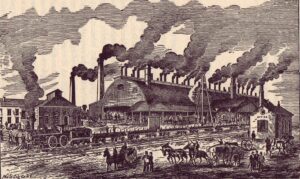 Editor’s note: I really don’t like folks who wear their religion on their sleeve. It makes me uncomfortable, kinda like when the Deet mixes with your sweat when you’re doing yard work in Georgia in July and you can’t seem to move without everything sticking to you. Maybe that’s just me. Both instances leave me wanting to get out of that awkward situation quickly and shower off all the memories thereof.
Editor’s note: I really don’t like folks who wear their religion on their sleeve. It makes me uncomfortable, kinda like when the Deet mixes with your sweat when you’re doing yard work in Georgia in July and you can’t seem to move without everything sticking to you. Maybe that’s just me. Both instances leave me wanting to get out of that awkward situation quickly and shower off all the memories thereof.
That said, I am also not one to miss sharing a good word. Thus in the midst of all the chaos and bad news that has filled my news feed as of late, I am happy to share a light in the darkness with all the readers out there. I recently moved my letter of membership to The Church At Ponce & Highland. My Minister to Families, Carra Greer, and her husband, Brian Greer offered an amazing word a few weeks ago that spoke to the sadness and frustration I have felt recently, in light of all of the senseless killings of our own people. Thus, I asked Carra if I might share their sermon with Southern Indeed readers.
It should also be said that Brian Greer is the first man Southern Indeed has featured as a writer- a thing of merit all of its own!
Personally, I really am not into complaining for the sake of hearing myself complain. Me? I am a doer. In my mind, there is always an opportunity for a resolution, solution, or way to fix things. It may not be perfect or pretty, but one of the reasons I have always felt called to policy and politics is because I know in my heart we can always strive to improve. I am no damsel in distress and you will rarely find me throwing my hands up in the air, looking for someone to swoop in and save me. For this reason, this particular sermon really spoke to me and in turn, I share it with all of y’all for your consideration of what we may do and how we may find comfort.
The sermon focused on the story of Sodom and Gomorrah in Genesis 18:20-33. Rather than focusing on the death and destruction, the Greers focused on the small flicker of light in the darkness. That’s my kind of theology, but certainly does not have to be yours. If discussions of faith and God are not your thing, you may wish to wait for the next post. Conversely, if you would like the audio of the sermon, please click here. And now onto the good stuff…
Continue reading “A Flicker of Hope” →
 I would like to wish everyone a happy Equality Day! August 26th is the date we commemorate (since 1971, thanks to Rep. Bella Abzug (D-NY)) the 19th amendment was ratified in 1920, giving women the equal right to vote in elections in the United States. As part of the memorialization of this day and women in our nation’s history, one can still step into the Capitol rotunda and look for a statue of the Suffragettes: Elizabeth Cady Stanton, Lucretia Mott, and Susan B. Anthony. When you find it, you will notice there is still a part of the statue that remains uncarved.
I would like to wish everyone a happy Equality Day! August 26th is the date we commemorate (since 1971, thanks to Rep. Bella Abzug (D-NY)) the 19th amendment was ratified in 1920, giving women the equal right to vote in elections in the United States. As part of the memorialization of this day and women in our nation’s history, one can still step into the Capitol rotunda and look for a statue of the Suffragettes: Elizabeth Cady Stanton, Lucretia Mott, and Susan B. Anthony. When you find it, you will notice there is still a part of the statue that remains uncarved.
